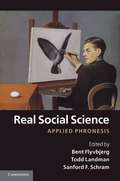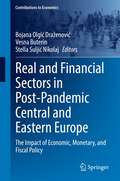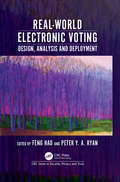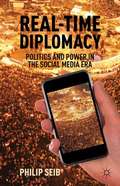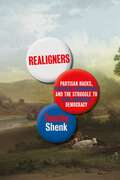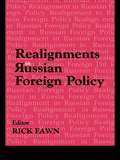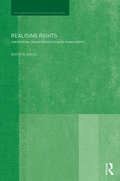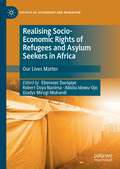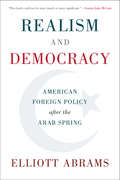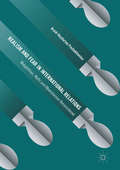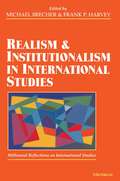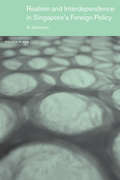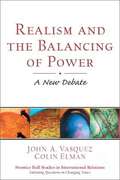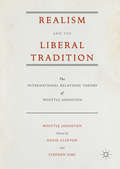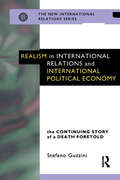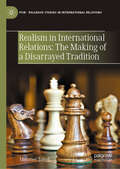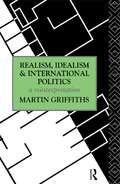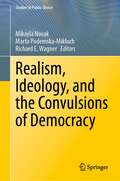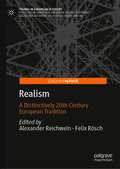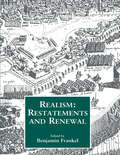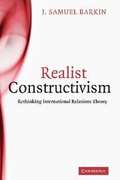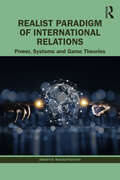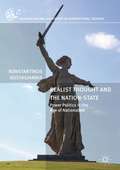- Table View
- List View
Real Social Science
by Bent Flyvbjerg Todd Landman Sanford SchramReal Social Science presents a new, hands-on approach to social inquiry. The theoretical and methodological ideas behind the book, inspired by Aristotelian phronesis, represent an original perspective within the social sciences, and this volume gives readers for the first time a set of studies exemplifying what applied phronesis looks like in practice. The reflexive analysis of values and power gives new meaning to the impact of research on policy and practice. Real Social Science is a major step forward in a novel and thriving field of research. This book will benefit scholars, researchers and students who want to make a difference in practice, not just in the academy. Its message will make it essential reading for students and academics across the social sciences.
Real World Micro
by Rob Larson Bryan Snyder Chris Sturr The Dollars & Sense CollectiveIt sometimes seems that the United States has not one, but two economies. The first economy exists in economics textbooks and in the minds of many elected officials. It is a free-market economy, a system of promise and plenty, a cornucopia of consumer goods. In this economy, people are free and roughly equal, and each individual carefully looks after him- or herself, making uncoerced choices to advance his or her economic interests. Government is but an afterthought in this world, since almost everything that people need can be provided by the free market, itself guided by the reassuring "invisible hand." The second economy is described in the writings of progressives, environmentalists, union supporters, and consumer advocates as well as honest business writers who recognize that real-world markets do not always conform to textbook models. This second economy features vast disparities of income, wealth, and power manifested in a system of class. It is an economy where employers have power over employees, where large firms have the power to shape markets, and where large corporate lobbies have the power to shape public policies. In this second economy, government sometimes adopts policies that ameliorate the abuses of capitalism and other times do just the opposite, but it is always an active and essential participant in economic life. Real World Micro will introduce to the second economy.
Real and Financial Sectors in Post-Pandemic Central and Eastern Europe: The Impact of Economic, Monetary, and Fiscal Policy (Contributions to Economics)
by Bojana Olgić Draženović Vesna Buterin Stella Suljić NikolajThis book offers new insights into the real and financial sectors in the post-pandemic European Union, with a specific focus on the countries of Central and Eastern Europe and a special reference to Croatia. The contributors examine the timeliness, justification, and appropriateness of the measures taken in response to the deteriorating economic conditions and the associated outcomes. They further discuss various aspects of economic, financial, and energy policy. While doing so, they focus on two important issues. The first is an analysis and assessment of the financial development and performance of the real sector. The second is an insight into the institutional dimensions of the COVID-19 pandemic, including the discussion of obstacles and opportunities for recovery in the near future. The topics covered in this book include, but are not limited to, unconventional monetary policy, financial cycles, fiscal incentives, institutional development and institutional quality, the banking system, real estate markets, competitiveness, pension systems, financial regulation, energy markets, environmental, social, and governance (ESG) factors, as well as agricultural policy. Therefore, this volume will appeal to researchers, students, and scholars of finance and economics, as well as policy-makers interested in a better understanding of real and financial sectors, economic policy, and post-pandemic economic development in Central and Eastern Europe.
Real-World Electronic Voting: Design, Analysis and Deployment (Series in Security, Privacy and Trust)
by FENG HAO AND PETER Y. A. RYANReal-World Electronic Voting: Design, Analysis and Deployment captures all major developments in electronic voting since 2003 in a real-world setting. It covers three broad categories: e-voting protocols, attacks reported on e-voting and new developments on the use of e-voting. This book explores recent innovations in both poll-site and remote voting systems and their application throughout the world. The requirements of elections are analysed, the available tools and technologies are described, and a variety of modern systems are presented in detail together with discussions of deployments. This is an invaluable resource for election professionals, researchers and policy makers alike. Key Features: Reviews both technical and social aspects of e-voting Covers e-voting protocols, attacks reported on e-voting and new developments on the use of e-voting Designed for government election practitioners and policy makers who want to understand the threats and opportunities in e-voting and assess its suitability for future elections
Real-time Diplomacy
by Philip SeibIn light of the events of 2011, Real-Time Diplomacy examines how diplomacy has evolved as media have gradually reduced the time available to policy makers. It analyzes the workings of real-time diplomacy and the opportunities for media-centered diplomacy programs that bypass governments and directly engage foreign citizens.
Realigners: Partisan Hacks, Political Visionaries, and the Struggle to Rule American Democracy
by Timothy ShenkAn eye-opening new history of American political conflict, from Alexander Hamilton to Alexandria Ocasio-Cortez. These days it seems that nobody is satisfied with American democracy. Critics across the ideological spectrum warn that the country is heading toward catastrophe but also complain that nothing seems to change. At the same time, many have begun to wonder if the gulf between elites and ordinary people has turned democracy itself into a myth. The urge to defend the country’s foundations and to dismantle them coexist—often within the same people. How did we get here? Why does it feel like the country is both grinding to a halt and falling to pieces? In Realigners, the historian Timothy Shenk offers an eye-opening new biography of the American political tradition. In a history that runs from the drafting of the Constitution to the storming of the Capitol, Shenk offers sharp pen portraits of signal characters from James Madison and Charles Sumner to Phyllis Schlafly and Barack Obama. The result is an entertaining and provocative reassessment of the people who built the electoral coalitions that defined American democracy—and a guide for a time when figures ranging from Alexandria Ocasio-Cortez to MAGA-minded nationalists seek to turn radical dreams into political realities. In an era when it seems democracy is caught in perpetual crisis, Realigners looks at earlier moments when popular majorities transformed American life. We’ve had those moments before. And if there’s an escape from the doom loop that American politics has become, it’s because we might have one again.
Realignments in Russian Foreign Policy
by Rick FawnThis collection provides international perspectives on the evolution of Russia's foreign relations and analyses official Russian responses to major regional and international developments, including NATO and EU enlargement and the post-September 11 international "war on terrorism".
Realising Linguistic, Cultural and Educational Rights Through Non-Territorial Autonomy
by David J. Smith Ivan Dodovski Flavia GhenceaThis volume assesses Non-Territorial Autonomy (NTA) in terms of its practical capacity to support the linguistic, cultural, and educational rights of national minority groups across Europe. The fact that 2023 marks the 25th anniversary of the coming into force of the Council of Europe Framework Convention on National Minorities (FCNM) and European Charter for Regional and Minority languages (ECRML) makes this book especially timely and relevant. Its numerous detailed empirical studies, one of which uses FCNM reporting as a benchmark, give a picture of the extent (or otherwise) to which international minority rights standards are actually being realized through various NTA arrangements. In keeping with the principles laid out in these foundational documents, the contributions to this volume acknowledge that when it comes to the effective delivery of linguistic, cultural and educational rights, NTA is best regarded not as an alternative but as a complement to territorially based arrangements.This is an open access book.
Realising Rights: How Regional Organisations Socialise Human Rights (Routledge Studies in Globalisation)
by Mathew DaviesThis book presents the hitherto unstudied variety of ways that human rights socialisation is attempted in the context of regional organisations, arguing that existing conceptual accounts of this phenomenon need to be expanded to best explain this diversity. By placing the study of the European Union’s relationship with Turkey alongside parallel studies of the Association of Southeast Asian Nations engagement with Myanmar, and the Organization of American States history with Panama, this book argues that rights socialisation efforts are far more diverse than previously thought. Alongside the conditionality that dominates the EU experience, and that has received the majority of existing academic attention, this book argues that both the politics of social influence, the strategic manipulation of legitimacy and the politics of debate over the meaning of membership also drive socialisation efforts. This book situates these socialisation efforts along the journey states take when applying to, joining and then maintaining membership of, a regional organisation, and further distinguishes between what conditions are necessary for socialisation to be attempted and what further requirements are needed for that attempt to be successful. To appreciate the diversity of socialisation politics revealed, this book constructs an inclusive conceptual framework drawing on both rational choice and constructivist theorising and will be of interest to students of Politics and International Relations.
Realising Socio-Economic Rights of Refugees and Asylum Seekers in Africa: Our Lives Matter (Politics of Citizenship and Migration)
by Ebenezer Durojaye Gladys Mirugi-Mukundi Robert Doya Nanima Abiola Idowu-OjoThis book examines the socio-economic rights challenges of refugees and asylum seekers in Africa. It seeks to fill a major gap in the literature by providing a nuanced discussion of the barriers to the realisation of the socio-economic rights of refugees and asylum seekers in Africa. It equally aims to provide some concrete recommendations to African governments towards the realisation of the socio-economic rights of refugees and asylum seekers. With the aid of lessons from selected African countries, this book highlights the gaps, challenges and good practices regarding the realisation of the socio-economic rights of refugees and asylum seekers in the region. The book will be useful to researchers, students, academicians, policymakers, and international organisations or institutions interested in advancing the rights of refugees and asylum seekers.
Realism and Democracy: American Foreign Policy after the Arab Spring
by Elliott AbramsAmerica is turning away from support for democrats in Arab countries in favor of 'pragmatic' deals with tyrants to defeat violent Islamist extremism. For too many policymakers, Arab democracy is seen as a dangerous luxury. In Realism and Democracy, Elliott Abrams marshals four decades of experience as an American official and leading Middle East expert and shows that deals with tyrants will not work. Islamism is an idea that can only be defeated by a better idea: democracy. Through a careful analysis of America's record of democracy promotion in the region and beyond, from the Cold War to the Obama years, Abrams proves that repression helps Islamists beat democrats, while political openings offer moderates and liberals a chance. This book makes a powerful argument for an American foreign policy that combines practical politics and idealism and refuses to abandon those struggling for democracy and human rights in the Arab world.
Realism and Fear in International Relations
by Arash Heydarian PashakhanlouThis book examines the fascinating story of how the chief architects of realism (Hans Morgenthau, Kenneth Waltz and John Mearsheimer) dealt with some of the most pressing political issues of our time through the lenses of fear. Pashakhanlou conducts the most comprehensive evaluation of their works to date, compromising of a meticulous analysis of 400 of their publications. As such, this book is an invaluable resource for practitioners, students and concerned citizens that seek to understand how three of the most influential International Relations scholars thought about the implications of fear at the global level. 'In this important book, the author gets to the heart of the underlying emotional condition on which so much rational political thought in International Relations is built. By uncovering the role of fear within the modern classics of realism, the book sheds light on the role that fear plays in producing otherwise rational decision-making. ' David Galbreath, Professor of International Security, University of Bath, UK 'The role played by fear in Realist international theory is under-explored and poorly theorised. This book addresses this lacuna and provides a thorough and systematic analysis of the significance of fear in Realism. In doing so, Arash Heydarian Pashakhanlou makes a major contribution to International Relations theory, and the 'emotional turn' in the study of contemporary international politics'. Adrian Hyde-Price, Professor of International Politics, Gothenburg University, Sweden
Realism and Institutionalism in International Studies
by Frank P. Harvey Michael BrecherMillenial reflections on international studies
Realism and Interdependence in Singapore's Foreign Policy (Politics in Asia)
by Narayanan GanesanSingapore’s existence and success derive in part from its achievements in the domestic political arena and in part from the skilful management of a well-defined foreign policy with clearly identifiable goals and issues. A visible core of realist self-reliance is layered with the demands of a competitive trading state that requires a liberal international trading regime. Hence, both competitive and cooperative philosophies support Singapore’s foreign policy. This text charts the philosophical underpinning of Singapore’s foreign policy output and the institutions responsible for it and examines the importance of economic and defence diplomacy that are central to Singapore’s foreign policy output. It gives particular attention to the two most important regional bilateral relationships -- with Indonesia and Malaysia -- and how relations with its adjacent neighbours have influenced Singapore’s foreign policy. Combining first-hand research with excellent analysis, this volume provides a much-needed report on the survival of a small state in the globalizing world.
Realism and the Balancing of Power: A New Debate
by John A. Vasquez Colin ElmanThis book explores all aspects of an important scholarly debate that has widespread implications for the political world, including the making of foreign policy--i.e., a debate over whether the contemporary theory of the balance of power as presented by Kenneth Waltz is a scientifically acceptable theory. It allows readers to examine and analyze the different views (in their original form) by all those in the debate and to come to their own conclusions. An Introduction gives an overview of the debate, defines and clarifies in simple language some of the major concepts used in philosophy of science, sets the historical context of the debate, and explains why it is important for both international relations theory and foreign policy making.
Realism and the Liberal Tradition
by Whittle Johnstondavid Clinton Stephen SimsThis book presents a posthumous collection of previously uncollected works of political theory written by Whittle Johnston. Johnston believed that both the liberal tradition of political thought and the realist tradition of international thought had contributed much to humanity's store of political wisdom, but that each had limitations that could most easily be recognized by its encounter with the other. His method of accomplishing this task was to examine the liberal conception of political life in general and international political life in particular and then to explore the realist critique of the liberal view, particularly as it was expressed by three great twentieth-century realist thinkers, all of whom were, in their various ways, skeptical of liberal assumptions: Reinhold Niebuhr, Hans Morgenthau, and E. H. Carr. In doing so, Johnston reveals the power of the realist outlook, but also the areas in which it remains insufficient, and insufficient particularly where it underestimates the complexity and prudence that liberalism is capable of displaying. There have been studies of both liberalism and realism, but no other work has put them into conversation with each other in the way that this book does.
Realism in International Relations and International Political Economy: The Continuing Story of a Death Foretold (New International Relations)
by Stefano GuzziniStefano Guzzini's study offers an understanding of the evolution of the realist tradition within International Relations and International Political Economy. It sees the realist tradition not as a school of thought with a static set of fixed principles, but as a repeatedly failed attempt to turn the rules of European diplomacy into the laws of a US social science. Realism in International Relations and International Political Economy concentrates on the evolution of a leading school of thought, its critiques and its institutional environment. As such it will provide an invaluable basis to anyone studying international relations theory.
Realism in International Relations: The Making of a Disarrayed Tradition (Palgrave Studies in International Relations)
by Mehmet TabakAccording to a pervasive view in the discipline of International Relations (IR): a) realism is a historical tradition, stretching all the way back to Thucydides; b) despite the important theoretical differences among themselves, realists uphold the same set of core beliefs about the workings of international politics. Together, these two claims amount to the perspective that realism is a sui generis scholarly tradition with ancient origins. The author critiques both aspects of this view by illustrating that realism is both a relatively recent tradition and a disarrayed one. He shows that the realist tradition entails conscious membership and participation in a common “realist” discourse that has produced fundamentally different, even opposing, methodologies and theories about the same or related phenomena in international politics. In illustrating this argument, the author critically explores a variety of seminal statements of, and debates about, realism. This exploration reveals that the conceptual and theoretical shortcomings of the major statements of realism significantly explain why realism evolved as a disarrayed tradition. Overall, this book makes an important contribution to the understanding of realism in particular and IR in general. The comprehensive and critical analysis of many facets of realism this book offers also yields many didactic elements.
Realism, Idealism and International Politics: A Reinterpretation
by Martin GriffithsThis book defends realism in the study of international politics and demonstrates the heuristic and evaluative utility of Robert Berki's interpretation of political realism and political idealism. It argues that realism is not a meaningless term nor redundant and necessarily rhetorical in politics.
Realism, Ideology, and the Convulsions of Democracy (Studies in Public Choice #44)
by Mikayla Novak Richard E. Wagner Marta Podemska-MikluchThis edited volume explores the tension between reason and sentiment in democracies and its contribution to the decline of liberalism. Bringing together classical liberal scholars with a deep knowledge of public choice ideas, the chapters delve into this tension from a variety of perspectives. Building on the principle of entangled political economy, as articulated by Richard E. Wagner, this volume engages with new facets of the relationship between choice and consequence and their implications for democratic politics. Advocating for a reframing of public choice theory as compatible with civic republicanism, this volume will be of interest to students and scholars of public choice, political economy, political theory, governance, and economic policy.
Realism: A Distinctively 20th Century European Tradition (Trends in European IR Theory)
by Felix Rösch Alexander ReichweinThis book examines how IR’s European realist tradition evolved in Europe and, due to emigration, in the United States in the 20th century. It includes an introduction and eight chapters, focusing on historical classical and contemporary structural branches of realist IR theorizing in historical and political contexts in which realist thinking did develop. It reminds us of realist key figures, such as Edward H. Carr, John H. Herz or Hans J. Morgenthau, but also of almost forgotten realists such as Raymond Aron, Stanley Hoffmann or Nicholas J. Spykman. Given IR mainstream textbooks introducing realism as a conservative American Cold War theory, this selection aims to reintroduce realism as a primarily and distinctively European, liberal, normative and critical tradition. A tradition that is almost always misunderstood as a guide for practitioners how to maximize or at least preserve power in the name of the national interest no matter the cost, but that is in fact an argument against reckless and crude power politics, ideology and totalitarianism. This book is an invaluable resource for scholars, practitioners and students interested in the realist tradition in IR.
Realism: Restatements and Renewal
by Benjamin FrankelRealism has been the subject of critical scrutiny for some time and this examination aims to identify and define its strengths and shortcomings, making a contribution to the study of international relations.
Realist Constructivism
by Samuel BarkinRealism and constructivism, two key contemporary theoretical approaches to the study of international relations, are commonly taught as mutually exclusive ways of understanding the subject. Realist Constructivism explores the common ground between the two, and demonstrates that, rather than being in simple opposition, they have areas of both tension and overlap. There is indeed space to engage in a realist constructivism. But at the same time, there are important distinctions between them, and there remains a need for a constructivism that is not realist, and a realism that is not constructivist. Samuel Barkin argues more broadly for a different way of thinking about theories of international relations, that focuses on the corresponding elements within various approaches rather than on a small set of mutually exclusive paradigms. Realist Constructivism provides an interesting new way for scholars and students to think about international relations theory.
Realist Paradigm of International Relations: Power, Systems and Game Theories
by Amartya MukhopadhyayThis book explores realist theories—also called power politics approaches, formulations of systems theories, and game theory in International Relations (IR). The first section of the book focuses on theories of Early Classical Realism—Thucydides, Machiavelli, and Hobbes, and two Asian exponents—Kautilya and Han Fei Tzu. It covers the rise and fall of different schools of imperial geopolitics including those developed during the Cold-War and postmodern periods. It also discusses theories proposed by three stalwarts of Neoclassical Realism— Niebuhr, Carr, and Morgenthau; the Neorealism of Waltz; Strategic Realism of Schelling; and Offensive Realism of Mearsheimer. The book also examines theoretic formulations of Kaplan, Modelski, Rosecrance, McClelland, Holsti, and Singer, as well as game theory and its relevance and application in international relations. It explores diverse variants of theories of power in international relations through a critical readings of texts and IR literature. This book will be of interest to researchers and students of political science, international relations, history and law.
Realist Thought and the Nation-State
by Konstantinos KostagiannisThis book recovers the history of realist theorization on nationalism and the nation-state. Presented in a sequence of snapshots and illustrated by examples drawn from the foreign policy of great powers, this history is represented by four key realist thinkers. It uses the centrality of power in realism as a starting point to claim, contrary to conventional wisdom about realism, that for realists the state is better understood not as a political unit outside history but rather as a manifestation of power unfixed in time. It also claims that the process of gradual impoverishment of the concept of power from classical to structural realism had profound implications for realism, as what the latter gained in parsimony it lost in analytical purchase. As a result, elaborate understandings of nationalism and its relation to the state are replaced by one-dimensional approaches. In order to offer meaningful engagement with foreign policy, neorealists often have to resort to the recovery of some of the complexity of classical realist accounts.
